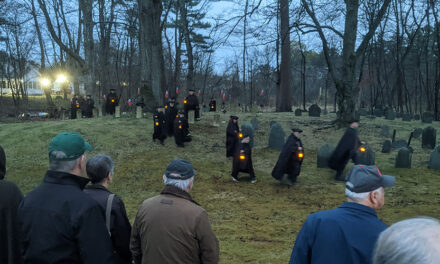By MAUREEN DOHERTY
LYNNFIELD — James M. Boudreau, the current town administrator of Norwell, will be offered the T.A.’s position in Lynnfield to succeed retiring Town Administrator Bill Gustus.
Boudreau was the top choice of both Selectmen Chairman Dave Nelson and Selectman Phil Crawford among the seven finalists and near the top of the list for Selectman Tom Terranova, but not among his top two. While both Nelson and Crawford wanted to extend an immediate job offer to Boudreau, Terranova wanted to continue the vetting process of the top tier candidates before doing so.
Following a lengthy back–and–forth discussion between the selectmen Monday night, the vote to extend the offer of employment to Boudreau passed on a 2–1 vote with Terranova opposed.
“I think he is very capable but I think there is a little more due diligence that we can do before we narrow down to one,” Terranova said of Boudreau.
Terranova’s top choice was current Boxford Town Administrator Alan Benson. Both Nelson and Crawford had rated Benson as their No. 2 pick out of the top seven finalists presented to them by the T.A. search firm, MMA Consultants. Terranova said his second choice was Jim McKenna, the town administrator of Winthrop, due to his ability to turn that town around over the past several years.
All three selectmen had high praise for MMA and its president, Mark Morse, for the firm’s expertise in finding and vetting 44 candidates for the position. Crawford pointed out that the top 15 candidates were current town administrators or mayors or held similar positions and “all were very well qualified in areas of finance and budget management.”
Each selectman spent a minimum of one hour individually interviewing the seven finalists, with many interviews lasting 90 minutes, in addition to conducting their own Google searches and following up with references and members of the communities where their top choices were employed.
Nelson said the records of the seven finalists showed a “stability of management” as well as “high levels of education.” Nelson said the ability to effectively communicate with people was an attribute he highly values for this position in addition to a candidate’s technical abilities.
“I think a good fit for the town of Lynnfield is someone who has all the technical abilities, but there’s more to it than just that,” Nelson said. “There’s how you interact with people, how you treat people that work under you, how you respect the community, how you work with the residents of town, how you do the right things and how you listen.”
Terranova said during his interviews he was interested in learning how each candidate would “service their town” and what it meant to them to be “open and transparent.” He said he placed a high value on each candidate’s “ethics, morality” and “problem-solving skills” and how the candidate would work for the betterment of the town and bring groups together.
He assessed the candidates’ response to the most difficult issue they had faced in the last five years and how they dealt with it. Terranova said he was looking for someone who was “energized by the possibility of coming to Lynnfield,” who felt he may have “plateaued” in his present position and was looking for “a new experience.”
Crawford said the top three or four candidates all possessed “excellent financial skills” and represented the “top of their profession,” therefore his decision rested on the person he believes would be the best fit for the town.
Crawford said he posed 20-30 questions to each candidate and also had more informal conversations with them to get an “idea of how they react” in various scenarios and whether they took a “proactive” approach to problem solving.
Nelson said he was ready to move forward and make the offer. “I don’t think I need another round of interviews,” he said.
Resident Dave Miller asked, “Since this is of substantive public interest can’t we find some way to do this in public and the public will have opportunity to give you input?”
Nelson said public input was not part of this process. “When we started this process we never agreed to have any kind of committee involved and (if there were) any public interviewing, the public is there to observe. I am ready to do something tonight.”
After the discussion Nelson directed Gustus to contact Boudreau and begin the contract negotiation process. If Gustus and Boudreau arrive at a consensus on the terms of his contract over the next two weeks, Gustus said he would have a document prepared for the board to deliberate at their next meeting in two weeks. This discussion would take place in executive session because it involves contract negotiations, Gustus added.
If Boudreau and a majority of the board agree to the terms of the contract a vote would be taken in open session to offer the contract to him. Under the town’s charter, the appointment of the town administrator cannot exceed two years, Gustus said, which differs from the typical department head contract of three years.
No salary range for the successful candidate was listed for the position in the town’s advertisement for the position; however, the ad did note that the current T.A. makes an annual salary of $175,000.
In response to a question posed by resident Katy Shea on how the town could get rid of a town administrator that they were not happy with, Gustus explained the Town Charter provides two ways to do so. “If at the end of the term of that contract a majority (of selectmen) decided not to renew the contract, it would be by a majority vote. But if you tried to remove a town administrator during the (contract term) you would need three votes.”
Boudreau’s background
Boudreau has served as the town administrator in Norwell for 16 years, and his longevity in the position was noted by both Nelson and Crawford as an indication that he must be doing something right.
The similarities between Norwell and Lynnfield were also seen as a plus by them. Norwell is an affluent South Shore town of 10,000 with an annual budget of $42M that utilizes a Board of Selectmen/Town Administrator governing format. This board was recently expanded from three members to five.
Accomplishments Boudreau highlighted in his cover letter included the establishment of a “strong financial team” that has enabled the town to grow its stabilization fund from $16,000 at the time of his appointment in Nov. 1998 to nearly $3M prior to the economic slowdown when the town needed to draw on it.
Norwell has certified free cash of $2.3M and the town’s strong fiscal management ushered in a three-grade improvement of its bond rating, to AAA, under Boudreau.
Boudreau also cited his role in regionalizing the town’s emergency communications dispatch with Hull, Hingham and Cohasset while securing $6M in state grants to build a new dispatch center, which enhanced the level of service and reduced costs for the four towns. He was appointed to the state’s 911 Commission as the Mass. Municipal Association representative and their success is being used as a model for other communities seeking to regionalize emergency dispatch operations.
Boudreau previously served as the town administrator in Harvard from July 1995 to Nov. 1998. From 1989 to July 1995 he served in the State House, first as the Legislative Director for the Committee on Criminal Justice for the State Senate and then as the Staff Director/Media Director for the Senate Committee on Public Service. A member of the Phi Kappa Phi and Phi Kappa Alpha honor societies, he obtained both his BA in political science and his master’s degree in Public Administration from UMass Amherst.




